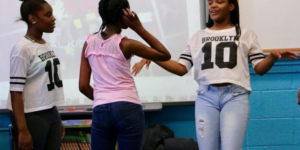Funny Girls: Evolving Into Leadership Roles In New Ways For Youth
Jenny Raymond, executive director of the Harnisch Foundation, signs her emails with this salutation: “With a mighty fist bump and hearty laugh.” And she means it, no kidding.
As a foundation, Harnisch has the mission to “create a fair, equitable and inclusive world” by supporting “the work of effective leaders and creative communities working to advance equality and inclusivity, with a focus on women and girls.”
“#FunnyGirls partners with Global Kids, New York, in a girls #leadership program.”
During this 20-year legacy of “investing in women’s leadership,” Raymond says, “There is not a woman who didn’t say, ‘I wish I had those skills when I was younger.’”
To that end, Harnisch launched the leadership training program Funny Girls in 2015 in partnership with the Magnet Theater and Pilobolus. Funny Girls curriculum “matches developmentally-appropriate improv exercises with corresponding leadership skills such as self-awareness, learning agility, collaboration, empathy, and resiliency,” according to the site.
This training for girls in third through eighth grades is part of “leadership evolution,” Raymond says. “We wanted to use improvisation as a methodology because there is no failure. We are teaching girls to be present.”
Funny Girls is an 11-week curriculum offered in four New York City schools and one in Richmond, Va., through the partners, Casita Maria Center for Arts & Education, DreamYard, Girls For A Change, Global Kids, and South Asian Youth Action.
“The hoped-for outcome? Girls will self-identify as leaders in their schools and communities,” according to the Harnisch site.
“After conversations with a multitude of girl leadership experts and improv instructors, corroborated by research from Harvard University, we knew the time was ripe for a formal leadership taught through improv curriculum aimed to help tween girls develop as leaders,” according to the Harnisch site.
Teaching “social justice through the arts,” Funny Girls’ partners offer the curriculum in under-resourced communities, says Carla Blumenthal, program manager of Funny Girls.
The program is based on five core skills of leadership, Raymond says, and those include self-awareness, empathy, resiliency, collaboration and agility. Through playful interactions, discussions, games and exercises, girls learn to “think out of the box” all within a community that is “safe and supportive.”
Working with Indiana University researchers, Raymond says the girls have a baseline survey and then a follow-up, measuring for “the evolution of the perception of self.”
The curriculum has practical applications and effects on the students who participate and eases them into leadership roles, Blumenthal explains.
“One girl says she was preparing for a science lab presentation and the other students in her group took out most of her work. She says she took a step back and even though she was feeling mad and frustrated, she was able to identify that and went to the students and asked how could she incorporate her ideas back into the presentation? And they did.”
The mentorship of girls in leadership roles is an international issue and receiving attention from many arenas.
“The mentorship of #girlsinleadership roles is an international issue”
According to UN Women, the United Nations Entity for Gender Equality and the Empowerment of Women, “There are 1.1 billion girls today, a powerful constituency for shaping a sustainable world that’s better for everyone. They are brimming with talent and creativity. But their dreams and potential are often thwarted by discrimination, violence and lack of equal opportunities. There are glaring gaps in data and knowledge about the specific needs and challenges that girls face.”
Girl Up, The UN initiative, was created because, “Girls are part of the largest youth generation that this world has ever seen. There are 600 million adolescent girls in the world today,” according to Girl Up.
Girls Leadership, co-founded by Rachel Simmons, author of Odd Girl Out: The Hidden Culture of Aggression in Girls and The Curse of the Good Girl: Raising Authentic Girls With Courage and Confidence, is spearheading new research on closing the gap for girls of color and leadership.
Looking to expand Funny Girls nationally in the future, Raymond says she and Blumenthal recently offered workshops at the annual Girl Scouts convention, as well as a workshop for Amy Poehler’s Smart Girls.
The pipeline build up for women in leadership roles can start as young as possible, and with Funny Girls, that is with eight to nine-year-olds.
“The pipeline build up for #womeninleadership roles can start as young as possible”
“This is enmeshed with our thinking about power,” Raymond says. “That is the core of what we are creating here.”
Like what you see? Sign up for more and receive the Take The Lead newsletter every week.
About the Author
Michele Weldon is editorial director of Take The Lead, an award-winning author, journalist, emerita faculty in journalism at Northwestern University and a senior leader with The OpEd Project. @micheleweldon www.micheleweldon.com

